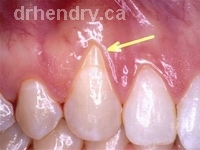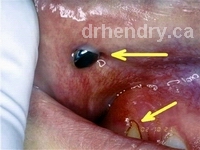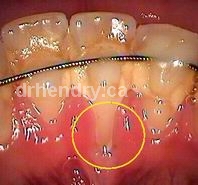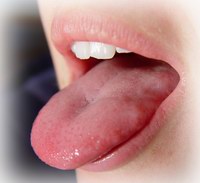
Top 4 Reasons to Have
Your Tongue Pierced:
Top 7 Reasons Not To:
1. Chipped or Broken Front Teeth
The majority of patients we see with tongue barbells wind up with chips, cracks or fractures in their front teeth. These have to be repaired with fillings or crowns. And re-done repeatedly when those wear out - over and over for the rest of your life.
2. Gum Surgery
We've had to refer patients to periodontists for surgical correction of damage caused by rubbing tongue barbells.
3. It can go down the wrong way.
The barbell can come un-screwed and wind up in a lung. (If you're lucky it can be removed by passing a bronchoscope down your throat, avoiding chest surgery.) Here's a case.
Going down the other way isn't necessarily great, either. The ball end should pass through harmlessly if swallowed. However the long part would carry the risk of lodging or causing internal tears in the intestine.
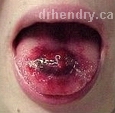
4. Infection and, just possibly, death
The mouth is moist and full of bacteria, and the tongue has major blood vessels ideal for spreading infection to the brain and elsewhere. This can disfigure or kill you.

The case at left was a local girl who almost died from
a brain abscess following a tongue piercing. She had part of her skull
removed to relieve pressure caused by the infection. She can still feel
the soft spot where the skull is missing.
This is rare, but it is real.

5. Losing blood - possibly lots of it.
The tonguecontains large blood vessels, and you're in trouble if one of them is perforated. You could end up having to have the vessel closed surgically in hospital.
There is also the possibility of hitting a nerve, and damaging
that. Imagine life with a tongue that doesn't work properly.

6. Lingering Pain.
Tongue piercing has been associated with cases of neuralgia - severe, long-lasting nerve pain. News Article Here

Unsterile instruments are a great way to spread these and other infections. If you must do this, be sure to go to a reputable clinic, and be very sure that they do things properly: autoclave sterilization and gloves.
Don't just take our word for it...
Want some more information about this? Check out these pages from:
Canadian Dental Association
Texas Department of Health
American Dental Association
UCSD School of Medicine
Canadian Dental Association Journal
(These are PDF files. If you don't already have an Acrobat
Reader,
we recommend the free reader here.)
Better still, go look for yourself. You can do a proper Google search
for Tongue piercing dangers right
here.
